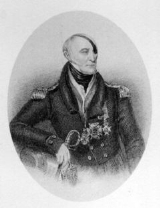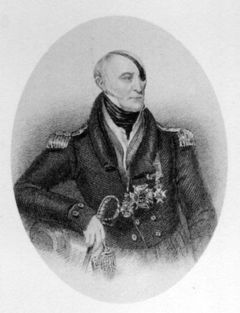
Nesbit Willoughby
Encyclopedia

Royal Navy
The Royal Navy is the naval warfare service branch of the British Armed Forces. Founded in the 16th century, it is the oldest service branch and is known as the Senior Service...
who was knighted in 1827, and made rear-admiral in 1847. He is related to Sir Hugh Willoughby
Hugh Willoughby (sea captain)
Sir Hugh Willoughby of Risley, Derbyshire was an early English Arctic voyager. He was sent out on 10 May 1553, as captain of the Bona Esperanza with two other vessels under his command and with chief pilot Richard Chancellor, by a company of London merchants known as the Company of Merchant...
(died 1554), who also figures in British naval history.
Willoughby entered the British navy in 1790 and was present at the battle of Copenhagen. In 1800, however, he was dismissed from the service by the sentence of a courtmartial for his insolent conduct towards a superior officer, a previous offence of this kind having been punished less severely. In 1803, on the renewal of war, as a volunteer he joined an English squadron bound for the West Indies, and was soon admitted again to the navy; his courage and promptness at Cape Francais
Cap-Haïtien
Cap-Haïtien is a city of about 190,000 people on the north coast of Haiti and capital of the Department of Nord...
were responsible for saving 900 lives, and he distinguished himself on other occasions, being soon restored to his former rank in the service.
After further services in the West Indies, during which he displayed marked gallantry on several occasions, Willoughby was tried by court-martial at Cape Town
Cape Town
Cape Town is the second-most populous city in South Africa, and the provincial capital and primate city of the Western Cape. As the seat of the National Parliament, it is also the legislative capital of the country. It forms part of the City of Cape Town metropolitan municipality...
in 1808 on charges of cruelty; he seems to have taken a great delight in inflicting punishment, but he was acquitted with the advice to be more moderate in future in his language.
While commanding the frigate
Frigate
A frigate is any of several types of warship, the term having been used for ships of various sizes and roles over the last few centuries.In the 17th century, the term was used for any warship built for speed and maneuverability, the description often used being "frigate-built"...
Nereide
French frigate Néréide (1779)
The Néréide was a Sybille class 32-gun, copper-hulled, frigate of the French Navy. On 22 December 1797 HMS Phoebe captured her and she was taken into British service as HMS Nereide. The French recaptured her at the Battle of Grand Port, only to lose her again when the British took Île de France in...
in 1810, he was responsible for the severe defeat of his ships against a French force commanded by Guy-Victor Duperré
Guy-Victor Duperré
Guy-Victor Duperré was a French admiral, Peer of France and thrice Naval Minister....
(144 guns and 600 men for the French squadron versus 174 guns and 1,170 men for the British) at Battle of Grand Port
Battle of Grand Port
The Battle of Grand Port was a naval battle between squadrons of frigates from the French Navy and the British Royal Navy. The battle was fought during 20–27 August 1810 over possession of the harbour of Grand Port on Île de France during the Napoleonic Wars...
, Mauritius
Mauritius
Mauritius , officially the Republic of Mauritius is an island nation off the southeast coast of the African continent in the southwest Indian Ocean, about east of Madagascar...
, when 222 out of his crew of 281 men were disabled before he surrendered. That was to be Napoleon's only naval victory. Duperré and Willoughby, both wounded during the combats, were treated in the same room after the battle. Undeterred by the severe wounds which he had received, and seeing no prospect of active service with the British fleet, Willoughby offered his services in 1812 to the Russian government. While serving with the Russian army he was captured by the French
First French Empire
The First French Empire , also known as the Greater French Empire or Napoleonic Empire, was the empire of Napoleon I of France...
. He eventually escaped from France to England. Having seen a little more service in the navy he died unmarried in London on the 19th of May 1849.
He is buried in Kensal Green Cemetery
Kensal Green Cemetery
Kensal Green Cemetery is a cemetery in Kensal Green, in the west of London, England. It was immortalised in the lines of G. K. Chesterton's poem The Rolling English Road from his book The Flying Inn: "For there is good news yet to hear and fine things to be seen; Before we go to Paradise by way of...
, London
London
London is the capital city of :England and the :United Kingdom, the largest metropolitan area in the United Kingdom, and the largest urban zone in the European Union by most measures. Located on the River Thames, London has been a major settlement for two millennia, its history going back to its...
; in Catacomb B under the Anglican Chapel, which had been completed in 1838 to designs by that cemetery's designer John Griffiths
John Griffiths
John Griffiths AM is a Welsh Labour Co-operative politician and the Minister for Environment and Sustainable Development...
. Willoughby "had the unusual distinction of being knighted twice, in 1827 and 1832. On the second occasion he was invested with the insignia of a K.C.H. Knight Commander
Knight Commander
Knight Commander is the second most senior grade of seven British orders of chivalry, three of which are dormant . The rank entails admission into knighthood, allowing the recipient to use the title 'Sir' or 'Dame' before his or her name...
of the Hanoverian Order
Royal Guelphic Order
The Royal Guelphic Order, sometimes also referred to as the Hanoverian Guelphic Order, is a Hanoverian order of chivalry instituted on 28 April 1815 by the Prince Regent . It has not been conferred by the British Crown since the death of King William IV in 1837, when the personal union of the...
, a curious blunder on the part of King William IV." He is remembered as one of the most reckless characters in British naval history, partially due to his being court martialled four times.
The Annual Register of his death noted: "He was eleven times wounded with balls, three times with splinters, and cut in every part of his body with sabres and tomahawkes: his face was disfigured by explosions of gunpowder, and he lost an eye and had part of his neck and jaw shot away... and at Leipzig had his right arm shattered by cannon shot."

